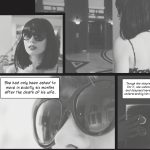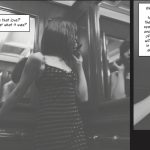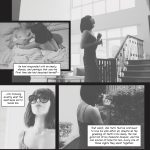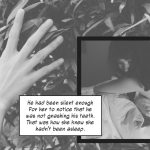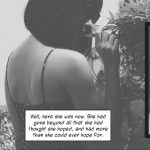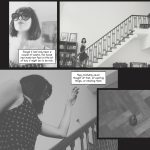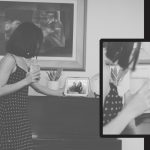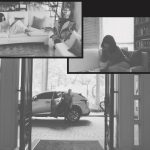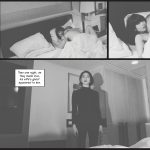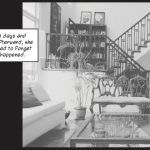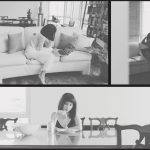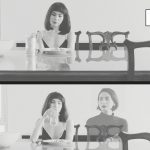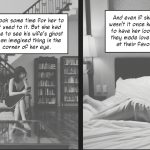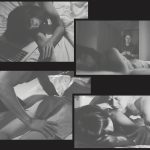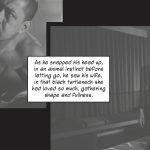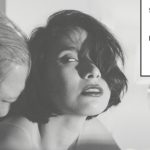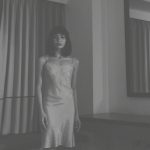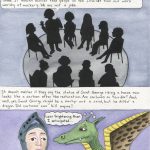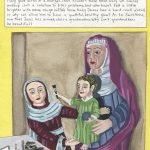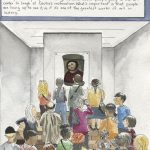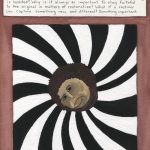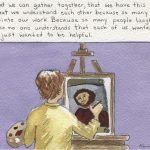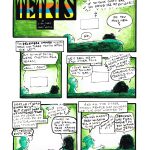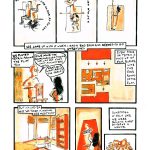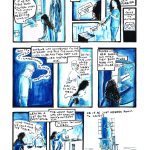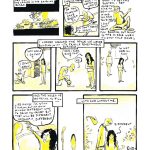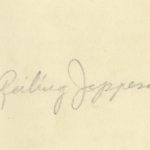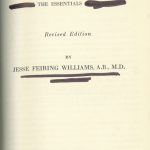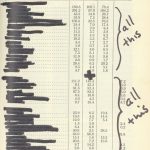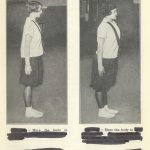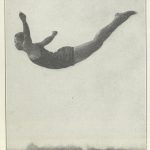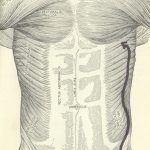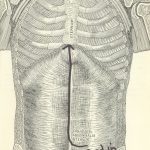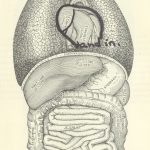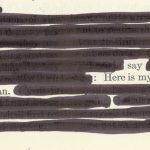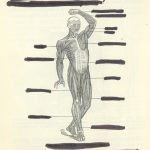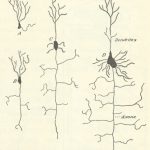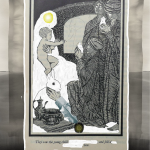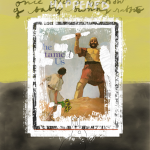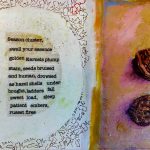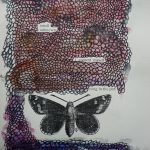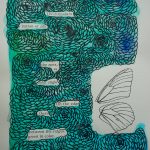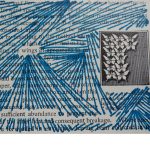Category: Literary Features
Earth’s Weight
He knows we uproot burdock
and hack down the musky trees of heaven.
He knows we kill mosquitoes,
but spare the killer spiders. He knows
how cats and opossums look
when they get run over: slick loops
of veined intestines, bulged eyes
and choked-out tongues. He knows
the living die, but do not want to die:
worm tugged thin from dirt to bird;
hooked fish muscling for the water;
scared pig scuffing against the ramp.
He knows we humans die, and kill
our own. He knows what soldiers are,
what warplanes do. He is four
and he also knows numbers:
a hundred and twenty-five pounds,
his mother. Sixty minutes, one long hour.
Three million people, the city of Chicago.
He’s four, and lately wants to know wars:
“Tell me a war, Daddy.” I name one,
and he wants the number of people killed.
The Civil War: six hundred thousand.
“Is that more than a thousand?
Can you count that many? Tell me
another war.” And another. He pays
attention. Vietnam: more than two million.
World War Two: at least forty million.
“That’s a lot, isn’t it?” Later he’ll ask, “Why?”
and we’ll talk about money, land, hate,
and following orders, but right now
all he wants is the name of a war
and the numbers of the killed—numbers
so vast you couldn’t count them
in a single lifetime, like the number
to tally earth’s weight—a number he loves
to tell and tell: six point six sextillion tons.
birth of venus

tidal women splay tempera
the conch pigmented against turquoise waters
her body sea-bound in paint and bone
she wears herself in brush strokes
zephyr and aura blow embryonic seawater from her shoulders
spring’s hora rushes to mantle her newborn curves
renaissanced she crashes borders architected
as venetian lips she cannot speak through
her body imaginative
almost cadaverous
she speaks around
she gazes as she is gazed upon
her nakedness to nudity
now pornographic
now classical
her body tidal
father her your words
your chipped teeth
your plaster-rotted frescoes
in your marbled mausoleums
she speaks you back
Cartilage
One night, when I was in grade school, my parents hosted a party. Other families came, co-workers. There were drinks. A man in a yellow tie had a margarita and then another and another. He said his ex-wife was a tramp. He stumbled as he passed from the living room into the den, where we kids were playing, entered the room looking unsure of why he walked into it.
“A bitch,” he said. “Total bitch.”
That night, I swore to my mom I’d never drink. She laughed, asked me why. I said I hated that man, that there was no need to drink, that I was happy without it. I was seven or maybe eight. She said I’d understand when I was older. I lay in bed, unable to sleep, knowing I’d prove my mom wrong.
The first time I got drunk was at Vlad’s, the summer after my freshman year of high school. We bought a handle of vodka so cheap, we thought, that the homeless man we’d given a twenty to buy it had given us seventeen dollars change. We passed the bottle with a shot glass and a chaser of store-brand cola. Around my fourth shot, everything started spinning. It felt good, wholesome, the ritual. Later, trying to sleep on Vlad’s floor, head resting on my bunched-up hoodie, I thought about what I swore to my mom, her laughter, and I felt an unmooring. Who knew what I’d believe in ten years? Twenty? Who would I be?
I was friends with Vlad because he and I rode the city bus together after school. By that point, my mom and dad had divorced, and on days at my dad’s house I’d ride one bus out from the suburbs into the core of downtown Seattle, where I’d walk up Stewart to wait by a garbage can on the backside of the convention center for the number 18, which then took me to school, just a stone’s throw from my mom’s. Vlad and I took advantage of our afternoons downtown, hitting the market for donuts or piroshkies or hum bao, drinking dollar tallboys of Arizona Iced Tea from minimarts where homeless people moved around in parallel to our thin reality, buying hot dogs or imitation crab sold on Styrofoam trays wrapped in cellophane.
Vlad had a knack for finding free food. At GameWorks we strolled the arcade, swiping a chicken leg off an abandoned plate, a slice of pizza at the bar. In the shampoo-scented hallways of downtown hotels, we found room service carts with scraps of porterhouse and baked potato, or the browned edges of a salmon frittata, the last bits of flesh out of the carcass of a Dungeness crab. We’d walk to the ballpark and talk down a scalper, or head up to the Starbucks on the forty-fourth floor of the Columbia Center to take in the view. Eventually, we’d split. I’d catch the 511 out way north, the ride quiet, still with the sodden air of evening commuters.
Vlad dropped out before the end of the school year. It made me wish I could drive. I’d sit alone in the back of the number 18, my biology textbook open on my lap, my gaze elsewhere, following the sequence of teriyaki joints and coffee shops, rain puddling at the curb.
My senior year, I saw Vlad in the parking lot at Leilani Lanes. I heard he’d been stealing cars. I’d tried to avoid him, but he caught up to me, put his hand on my shoulder. He asked if I wanted to buy some greeting cards and produced from under his jacket a small binder of samples. He told me I could make a good buck in the greeting-card game and invited me over to see how it was done.
His house, his parents’ house, smelled like chicken and mildew. None of his family was home but his friend was there, a guy with a gentle, fragile smile that made me anxious. He was seated in the parlor, where they’d spread a table with patterned cardstock, scissors, bottles of glue. Vlad asked if I was hungry and retrieved a roast chicken from the fridge, submerged in its own congealed juice. We ate it cold, with our hands, our fingers glistening.
We smoked a joint in the woods. His friend talked about how it easy it was to crib a Toyota. I got the sense he was trying to impress me. Vlad asked if I wanted to steal a car with them.
“Nah,” I said, and wondered why I hadn’t just said no.
We wandered the neighborhood in the wash of streetlight, going nowhere in particular. I kept smelling my hand, thinking about if my mom would smell the weed.
When I’d come home the morning after getting drunk for the first time, I’d been worried she would smell alcohol on my breath. I could feel booze in my mouth and lungs, in my pores, in my sweat. I stood in the entryway telling her we mostly played Xbox.
“Are you okay?” she said. I felt like I’d been emptied out and then filled with vapor. But from her tone and expression I knew that she knew what I’d done and also that she didn’t mind. It was like I’d crashed through some invisible barrier from one reality into another more like hers. She had known my whole life this feeling that felt so new, this hollowness and also the night’s strange spinning joy.
My hand didn’t smell like weed, but it did smell like chicken cartilage. Those days I thought a lot about the smell of food because I was working part-time washing dishes at a burger joint. I was terrible at it. Each day I’d come home soaked, my shirt thick with grease, ketchup, tartar.
“You going to college?” Vlad asked.
“Yeah.”
“Where?” his friend said.
“California,” I said. “Got a scholarship.”
Vlad said, “What are you gonna study?”
I’d been telling people business with a minor in art history but that was a lie. My mom had a fantasy of my future where I ran a restaurant and painted on the side, but all I knew was the certainty of a looming void stretching out before me. I still felt like a child, no direction, no idea what was next. And here was Vlad. Whatever next was, he was already living it.
We turned a corner and another, began to run out of small talk. I didn’t know it would be the last time I saw Vlad, but I didn’t not know it either. There was a damp gust, and I zipped my baggy raincoat shut. It was cold but not too cold, wet but not really raining.
Starlight
I bring the watered-down wine to my mother’s lips
hold the plastic cup at an angle, tilt the straw.
Pleasures remain, and we practice them.
The body in water.
The anticipation of spring.
Hummingbirds.
Above the deck, a string of lights levitates
below the sunshade like a globed consciousness
working only in the night.
Below the deck—small animals,
bundles of rustling nerves.
How many worlds?
How many dimensions hiding
in our perceived walls? In the dark of summer
we watch insects give themselves to fire
and we take in my father’s stories with more wine,
more water. When it is time, we will rise together
on the homemade lift into the living
room. We will wheel down the hall and
my brother will cradle the arc of my mother
in his arms and lay her to sleep in bed.
This is the geometry of dying—
and our grief is a closed circle
concentric in its company but radiating
like the fire does, and the glass festoons do,
and as all light will, arriving
from anywhere and touching anything.
O, the starlight—
when moved by a turbulent atmosphere—
how it spreads.
Poems of Cruelty and Compassion
Poem with Too Much Rope in It
After the opening of The National Memorial for Peace and Justice
I’m thinking of humans who cut the testicles off other humans, who string up
their fellow humans and laugh. Of people who set other people alight for the crime of
uppity, for the crime of gay, for the crime of, I refuse. I’m worrying about
my fellow humans, who can hang a pregnant woman upside down, disembowel her,
leave the fetus dangling—
I’m thinking of the many loving humans I know. Sheltering humans. I’m worrying
about how many people after the war still thought Hitler’s big mistake was
not killing all the Jews. Wondering, too, about those who hid entire families in
a few small rooms, risking the murder of their own. How do we reconcile this—
the fervidly brave, the fervidly cruel. Happy informers. The disbelieving informed. Them
and Us. Who did this to you? I want to ask victim and perpetrator—
I want it to be someone’s fault: twisted leaders, bad parents, beatings.
Or maybe it’s a Darwinian experiment. Something coiled in our genes. Here are
the conditions: let’s see who lives, let’s see who fouls their soul. Either way,
I walk down the street with affable people who would do these things—dangle
suffocating humans from branches, drag them behind jouncing pickup trucks and laugh,
roast alive the very humans who maybe—in another life—they dearly love.
Is there a life in which I’m laughing along with them?
Knees
Tomorrow, my father gets his foot
cut off—too much pain for too long—
time for another divorce.
For years, he declared
he was too old for this.
Maybe he was too young.
What a shiver—sickness,
wheelchairs, walkers,
canes. There’s been talk
of complications,
of a cut above the knee—
like the hem on a sexy skirt.
But he will insist, he says,
on below the knee. March—
a bit of snow clings
to the ground, but in his garden
he’s planted spinach already.
By my front steps this morning,
the hyacinths just beginning
to bulge out of the ground
remind me of knees—
how green and incipient
we can always be.
Below the knee—
all the things
he has done,
has not done,
could do,
can still do,
on his knees.
Professor Wyckhuis
Professor Wyckhuis would stand at the front of the classroom and lecture, his gaunt face tilted to the podium, his bare scalp growing red with fervor. He’d occasionally whirl toward the board behind him and scribble out etymologies, the chalk popping and splintering in his hand.
After class I’d join him for coffee in the Union. He would smoke cigarettes and touch his stout mustache and gently answer my questions about the Platonists and the Church Fathers, or describe his own scholarly projects: translations of commentaries by obscure saints and monks and mystics.
I once confessed to him that I was given to daydreaming, to making stories, and he, in a typically tender gesture, proposed that I might think of it as prayer and submit gratefully to it. We were walking beneath the trees of the quad, and he explained that the imagination might be exercised to understand our fears, and delight in the works of God, and grieve for our sins.
“Then,” he said, “if our devotion is deepened, and our minds not scattered, we may be called to the contemplative life.” He bowed his head and briefly closed his eyes to recite the words of—he later told me—a French parish priest, speaking so softly that I had to lean toward him. “The interior life is like a sea of love, in which the soul is plunged, and is drowned in love.” And then he opened his eyes and looked at me. “Just as a mother holds her child’s face in her hands to cover it with kisses, so does God hold the devout man.”
The story was that he’d left the priesthood in order to marry, his eyes still wetting with emotion whenever he’d speak of his wife, an elementary school teacher from Missouri, who’d passed from this earth twenty years before.
And there was also a competing and more dramatic story, that his wife had been a French girl, whom he’d impregnated when she was still at the lycée. It was then that he’d left the Church and married, and it was shortly afterwards that she and the baby died, the new bride hemorrhaging during childbirth, the infant’s neck bound with the umbilical cord.
If true, did he blame himself for the deaths of the schoolteacher or the French girl and the innocent child for whom he’d given up God, and whom God, in a show of spite and bile, cast to dust?
A reckless undergraduate was said to have mentioned the rumors to him, and he was reported to have smiled and said, “Charming,” and then, touching the student’s sleeve, “It is of course always easier to love the dead than the living.”
He once admitted to me that he’d stopped on the way home from campus the night before to buy a copy of Playboy. “I was angry,” he said, nodding his head. “I was very angry with God.” He crushed out his cigarette in the ashtray upon the cafeteria table. “So then,” he said, his jaw thrust forward, and he shook his fist in the air.
Once, late at night, Greta and I were leaving a party at a house just off campus, and we saw him walking slowly along the dim sidewalk across the street, in the direction of his own house, two or three blocks away. Twice he stumbled, the second time falling to his knees.
“Oh, Joe,” Greta said, and we started toward him, but one of the hosts of the party, a graduate student, who was standing on the lawn and talking to some girls, said, “I’ll get him,” and trotted across the street, helped him up, and then, his arm around the old professor’s shoulder, escorted him home.
There was a small memorial service for Professor Wyckhuis in January of my senior year. His body had already been flown to Antwerp, where a lone surviving brother was to bury him. As Greta and I stood in the dim chapel near campus, I felt thin and frightened, as if I’d been scooped out.
“Joe?” I could hear Greta’s whisper at my shoulder, feel her hand on my arm.
Later, outside in the glare of the winter sun, she told me that I’d begun to whine, a sound so slight and high pitched that she at first become aware of it only at the breaking of her own breath.
When he heard I was engaged, Professor Wyckhuis told me not to enter into marriage easily. He said that only those who’ve never been married or are destined for divorce think that they’ll not tolerate woundings or pain. I could smell tobacco on his sweater as he sat near me, clenching his hands. “It is like faith,” he said. “Some do not understand the necessary agony of the relationship with God, and so their faith . . . ,” and he suddenly splayed his fingers, like an object scattering.
His brother had directed that his personal property be given away or destroyed. And so in rounds—faculty colleagues, graduate students, and then undergraduates—we strolled through his house—polite shoppers at an abandoned flea market—bending to examine books, peering into dark closets, smoky with old sweaters, glancing at the chipped china in the kitchen, looking for something to take with us.
Everyone stepped softly past the bathroom. Devil’s madness.
The walls in the living room and bedroom were yellowed and bare, the dresser and table tops white with dust. I stood before his narrow bed and picked up from the pillow his glasses, the gold spindly frames, the lenses smudged, the nose pads mossy with oil and skin.
And then my face began to ache, as if I’d been struck, and I left his house without taking anything.
During the time that I knew him, Professor Wyckhuis battled insomnia. We rarely spoke about it, but I’d sometimes notice a weary edginess as we had coffee, as he answered my questions, sometimes struggling to recall a name or find a word.
“Have you seen a doctor?” I would ask.
“Yes, yes,“ he would say, nodding, and he’d shrug. “But it is the cigarettes, I think.” Or he’d simply smile and recall the words of some medieval monk. “Suffering is short pain and long joy,” he’d say.
Once, during the fall of my senior year, he stopped me on the quad and gave me a copy of his latest book, a translation of The Cloud of Unknowing. He offered it to me and then bowed. “A gift,” he said.
On the title page he had written, in his small, cramped hand, “To Joseph, Thank you for your spiritual help in the past. I wish you the best always: Deus providebit.”
When Greta became pregnant, she and I would walk the small Kansas town to which we’d moved, out to a graveyard on its north edge, five flat acres in a pocket of mulberry trees. It was there that we decided upon the name Hannah. We’d been taken with the tall and graceful headstone of a woman named Hannah Jane Flax, who was born in 1859 and died in 1947, and who was surrounded by family members, some—a husband, two children, and a grandchild—preceding her there, all now lying peacefully beneath blizzards and droughts, removed from the welter of the world. Greta saw her in those terms—a life lived deeply and then the serene and slow re-absorption into the earth. I tried to reckon the anger and the grief of those left living, that which had been loosed over the years on these few acres, the weight of accumulated mourning, still, surely, in the air, the damp of it on our skin.
I labor at forgiveness, thinking of Professor Wyckhuis’s instruction, his quoting of Francis of Paola, that the recollection of injury adds to our anger and nurtures our sin. “It is,” he said, touching his breast, “a rusty arrow and poison for the soul.”
He once told me that Qoheleth, delivering one of most brutally honest books in the Bible, revealed that traditional wisdom has failed, that we can’t know God, that we lack control, and that life is short and death certain. “However,” he said, crouching, bending close to the surface of the cafeteria table, his fingers poised as if to pluck from it a crumb of bread, “joy can still come to us in small portions.” And he looked up at me and smiled. “We need to be attentive.”
The story was that Professor Wyckhuis’s landlady found him dead in his bathtub, three days after Christmas. In the wastebasket were, supposedly, empty bottles of lorazepam and Tylenol and a spent blister pack of Sudafed. On the bath mat was a half-full three liter bottle of Rosso di Montalcino. His wine glass wavered on the bottom of the tub, between his legs, beneath the skin of cold water.
The story was that at the beginning of his last final exam in December, he wrote upon the board, Faith is the agent of things un-hoped for, as the thief proved. And the students laughed, and he winked and wished them luck, and left the room, and the building, a graduate student arriving to proctor and pick up papers. And no one on campus ever saw him again.
3am
Sleepless, I walk A1A, right down the middle, feeling the road warm under my bare feet. Street reflectors glow orange, like little matches that light the way. Waves crash, and a distant car echoes this way or a frog chimes, soft reminder I’m not alone. Sometimes I walk until the sun touches the horizon, and blue jays warm the air with lust. At home, he sleeps on his right, arms and legs curled around a pillow. Yesterday, he teased: How does it feel to want? Sometimes the moon is a gold thumbprint in the indigo above a dark ocean. Sometimes nothing more than a slice through sky. Sometimes stolen, gone with clouds thick as dreams.
Two Poems
Lowboy
My mother called
the antique mahogany dresser
that held her daughters’ underwear
in the hallway that ran
from her room to ours
a lowboy. On top of him,
she set an antique clock
that chimed every hour,
counting our lives for us.
At noon, I drank
in twelve bells, counting
ten on my fingers
and tapping my heart twice
with my pointer finger.
I was a child in love
with ritual but
I never questioned
my mother’s—to house
her three daughters’
multi-colored snake pit
of lace and satin and cotton
in the same wooden box,
stored where other mothers
treasured silver knives,
miniature spoons, and linen
they knew how to fold
into birds that posed on bone
china plates as men took
their seats at fancy tables.
Ours was a blurry childhood.
Our mother did not believe
in separating the strands of anything—
she threw every kind of utensil
into one empty, unlined
kitchen drawer. Her necklaces
struggled in a level of tangle
she’d never live to undo. We got lost
in the spice cabinet, could never
find the flavors we craved most
and our water would boil over, stain
the black sheen of the stovetop
as our books leaned against each other
in a confusion of genre. Surely
our illustrated Cinderella yearned to pry open
the pages of my mother’s art books
where women spread their legs, refused
to don lingerie. My mother hurled
her apprentices’ unmentionables
into a place that reeked of a forest
before it’s been selected and sliced
by the town’s strongest men.
We idolized her, but questioned
what life was like at other houses
where dinner parties twinkled
as we watched them, barefoot
from the street with our hair matted
into braids from the previous week.
The plates and saucers soared
to each guest like clockwork
as they gripped their forks,
licked their lips and leaned back.
Perhaps every woman in our house
was jealous of each white,
monogrammed linen cloth,
how it rested gently
in the warm lap of a man,
how it got to be lifted
by experienced hands
toward his hungry mouth.
I Told My Mother I Was Attending Church with Anthony Steele
It never occurred to me that anyone would know me like I know myself.
The first time a boy put his tongue between my thighs
was on a wooden picnic table. It was Sunday. Broad daylight. I was
splinterless on his father’s boat as that boy named after metal,
named after taking without someone’s knowledge,
ferried me gorgeously out to an unnamed island he knew would be deserted.
I plunged the steel anchor into the crest of the shore and our bodies broke
away from the boat, leaping into the dunes where we lapped salt water
off each other until we were dry again. We hid behind palm fronds like
the ones laid before Jesus as he rode to his crucifixion. It was exhilarating
to be laid gently on a wooden altar. I turned my head and studied
a circle of gray stones where ash danced, flitted away from where
a fire once roared. Sizzled. I wanted to burn, so I covered my eyes
with my hands to shield the light. I don’t remember either of us praying.
Triple Phantasy
Elegy for My Father

When he died last month at 91, my dad left boxes and boxes of black-and-white, sepia, and tinted photographs, along with a mahogany crucifix on which the Virgin Mary is suspended. Black hair, probably a horse’s, flows from the Virgin’s scalp and skirts her narrow waist; she has two tiny discs of grey-veined mica for eyes; and her feet are malformed, curving outward like jester shoes. I’d never seen this figurine in my life. I found it in Dad’s pocket a few hours after he died. The oddest thing, however, is that—whether it’s a fault of the woodworker, an act of vandalism, or a consequence of one of my father’s devious moods—the Virgin’s right breast is missing. The left side has an oval hump; but the right side is flat, smooth, and palely smudged as though rubbed vigorously with sandpaper. Along the back of the cross is carved: “To Amelia, from Dad.”
We shared many irreverent jokes; neither of us were orthodox Christians. But this figurine, I admit, makes me uneasy. Why is her breast sanded down? Can a single object inflect the narrative of an entire life?
Dad loved dolls, that I knew. He was the only man I’d ever met who kept an extensive collection of them—enough to fill an entire closet. As a child, I could never step foot in that uncanny sanctuary (or, to my mind, mausoleum) without chastisement; although at times, when he was out photographing the mountain landscapes and mountain people—the thing he loved to do above all others—I’d sneak in and caress their porcelain faces, turn their eyeballs to the left or right, or, when I was especially lonely, embrace them carefully without altering their positions.

There were big dolls and little dolls; conventional ones and quirky ones. I remember waiting for him in his Model T as early as nine years old while he hunted for dolls in drug stores and dusty furniture shops that made my allergies act up. The last doll he bought was in an antique store in Brevard, North Carolina; it was gigantic, dark-haired, with arms as pale and thick as split oak slats (I don’t know why this doll, in particular, finally satisfied his collector’s heart and completed his coven). He photographed them all, but of this Virgin Mary there are no extant photographs.
Dad was what you might call a shutterbug. He conceived of life as an album of images. His memories, for the most part, were tied to particular photographs he’d taken at one time or another. He entered Kodak contests and lost them. He wrote Kodak often complaining about their overrepresentation of northern urban photographers and the relative neglect of southern rural ones in contests; he wrote them about their new products; he wrote them about copyright law. I remember falling asleep to the ring-clack and furious metallic swings and snaps of the typewriter.
In the 1920s and ’30s, during the decline of tenant farming and in the heyday of folk photography, each town or hamlet in rural America had its resident photographer (Dad was born in 1889 and I in 1909). Men and women from Hemlock Cove, Olto, Judaculla, and Gallow Hollow frequented Dad’s studio and the Attic Window darkroom. They’d come with baskets of huckleberries, lovely foot-high April morels, and birch sap candy especially for me. They had names like Mossie Reynard, Earl Palmer, Gideon Laney, Imogene Bascom, Reinfried Romanes, and Max Straub. Like my dad, none of them made a splash in the photography world. At best they placed a few pictures in the Atlanta Journal or Audubon magazine. But Dad never kept friends long. He’d get into some bitter dispute with them about aesthetics or the superiority of a particular strain of vegetable. He had so many of these short-lived artist friends who shared and exchanged photographs with him that it’s impossible for me to know which of the tens of thousands of photographs he left behind are in fact his. The overwhelming majority are, certainly, but the outliers I can’t identify. My eye isn’t sharp enough and perhaps his style wasn’t distinct enough.
Throughout our lives, Dad and I would venture to the obscurest regions of our property, which was five square miles of oak, creek, and granite dome. He called our home in the cove Amelia’s World, because I spent all my time there gardening, walking, and writing while he was off taking pictures. We’d search for lonely abandoned chimneys from the nineteenth century—the relics of the crude cabins of Cherokee and frontiersmen, which often tilted dramatically on uneven ground. These one can find all over western North Carolina, hidden in rhododendron coves: creek rocks rising twelve feet high layered with clay chinking and reinforced with rope, hair, and hog’s blood; the splintered horizontal slats made of poplar. Over time, bees bored into the chinking’s hard pottery. Sometimes we’d light a fire in one of these crumbling hearths and smoke would pour out of the holes.

Dad’s death was a painful one. It feels almost irreverent to speak of it. The few distant cousins who visited struggled to keep their hands from their faces. He had bulging sores resembling purple tomatoes, some split open and oozing as if struck by the blight. His body was like a neglected garden at the onset of winter. I dabbed his sores with a cold cloth day and night during the final struggles. His last wish was for me to cover him with his dolls. His face glowed as he tossed and turned, coughing, spitting up fluid and blood; it jutted out from the top of the porcelain and cotton bodies so that it seemed he wore a grand, puffy Elizabethan dress with ivory lacework.
Dad had many sayings: “the best and worst things in life are errors of the stars”; “we’re just searching for a lucid interval”; “our knowledge is a journey from ruin to ruin.” These cryptic maxims I’ve found myself pondering in the days since his death. Over time, we came to share a similar philosophy. We believed travel outside Appalachia, for instance, would not edify the mind. Close observation of oneself and one’s immediate surroundings is the key to parting the curtains of mystery, however briefly; sense impressions decay into a precarious reality and the laws of nature can change at any moment. But we never held our breath awaiting those changes.
Some of his quirks I picked up. We both preferred corncob pipes with bowls cured with apple butter; it made the brightleaf tobacco from our garden taste sweeter and heavier than molasses (I’m smoking an old corncob right now at my writing desk; my hand shakes more than in the past and I pull the smoke with less vigor, but I experience the same relish as in my early adulthood). Neither Dad nor I owned a mirror. On the rare occasions we looked at our reflections, we did so in the convexities of tablespoons, and only then out of a sense of curiosity, never vanity or self-critique. We should move through life, Dad said, like a living soul in love that knows it’s loved in return, that doesn’t desire more or less as it stands on the bridge between self and other. That was his roundabout way of saying that we should accept our insignificant selves as they are.
I remember the winter it snowed and never let up, the flakes hissing and shifting on the branches, rocks, and roofs. In a fit of rage one day, due to some accident in the darkroom that ruined a batch of prints, Dad threw his ice-crusted walking stick against the wall—and it’s still stuck there. Somehow the tip wedged perfectly between two boards. We thought it quaint to leave it. In later years the walking stick reminded us of that long brutal winter and cut us with nostalgia, remembering the faerie cabins we built with pebbles and bark; the chunks of granite we heated in the stove and used to warm our feet; the icy shock of creek water in our throats; the night we glimpsed a freak offshoot of the northern lights weaving blue and violet nets around the moon; our midnight feasts on crystallized honey; and reading the Gospel of Thomas aloud until we drifted to sleep.

Living with Dad was not always easy. Rarely did we get on each other’s nerves, but there were times, especially towards the end, when he’d come in needy and sulking, desiring compliments. For sixty-plus years we’d discussed the people and places he photographed and the prints he left lying about the kitchen counter or that he had genuine questions about, which my untrained eye could help him clarify. When his body and spirit began to fray, however, he started leaving
photographs in places I’d find when I was alone: on my writing desk, bedspread, and rocking chair; in my tackle box, where I kept my rocks; and in my jewelry box, where I kept some beloved, much-read letters from an old flame. In the garden I once found a Polaroid caught in corn silk. It was a portrait of a woman I’d never met. She had sensuous lips that turned down at the ends and a bold beautiful forehead. Her eyes were closed; a horny crust, some kind of skin condition, populated her eyelids. The next day Dad asked me about it. Was it good or bad? Should he submit it to a magazine?
The first few times he did this I told him how moving the photographs were. I patted him on the back and flicked him affectionately on his balding pate. But as time passed, it angered me that he wanted me constantly to be his praiser and applauder, his confidant in art’s triumphs, failures, and transgressions. I wanted nothing more than the communion of easy laughter and the intimacy of long silence. That was how it had always been. It hurt to alter my attitude toward him, to play a role other than daughter. In the final two years his liberal spiritual convictions began to wear thin, and I suspected he was becoming secretly zealous in a manner he was embarrassed to admit to me, given our long history of unorthodoxy and light heresies. He’d hide himself away in his workshop reading a copy of the New Testament that he’d picked up at the Baptist church down the road. Once, when he lost his pipe, and we couldn’t find it anywhere in the cabin, I heard him mutter: “My God, why hast thou forsaken me?” I laughed. I thought it was a joke, but his expression was solemn. In spite of these things—which I’ve hesitated to commit to paper—he was my only friend and would’ve carried the cross or burned for me. An elegy, unlike a eulogy, should be honest in its longing for souls no longer in reach and should not shirk the hard truths of a complex life.
On the end table, there’s a browning, half-eaten peach with Dad’s bite mark still intact. I can’t throw it away. I think of how often he fretted, especially after he turned eighty, that all the peach trees in North Carolina were dying. He carefully documented their mutilations after the April freeze. He didn’t go exploring the mountains and rivers as far as Asheville anymore, but stayed near Amelia’s World, beekeeping, making muscadine wine, and worrying over our failing orchard. He often related dreams of worms, molds, and hard white blights like baby teeth infesting the fruit.

For some reason I can’t help but connect the missing flesh from this half-eaten peach—where Dad’s long, rabbit-like teeth scored as deep as the stone—with the Virgin Mary’s missing breast; and I can’t help but connect her missing breast to my motherless life. Of all people to have no photographs of, I have none of Mother (never “Mom”). Dad took hundreds of the goat man who visited the byways of Appalachia once a year in his junk-filled wagon pulled by goats; he has thousands—literally thousands—of pictures of purple martins feeding their young from perches in hollowed-out gourds hanging from poles. None, however, of Mother. Dad only started documenting the still, silent world after her death; in his photographs, the mysteries of loss were lulled into chemical innocence.
Mother passed away a few weeks after childbirth when I was two years old (my brother was stillborn). I was too small to remember her. Like clockwork, once a month (during the entire seventy-one years I lived with Dad, up until those final weeks), I’d walk into the house to find him drinking sassafras tea in the kitchen and crying, almost silently, his shoulders heaving. Few things made me so uncomfortable. It transformed me into his parent. I’d always pretend I didn’t see and pass quickly through the room. He never detained me but once. On that particular evening he spoke about Mother, how she had been feverish before she died. She didn’t rave exactly; she was lucid, just bathed in sweat and bright-eyed. She related certain visions: Christ in the desert, hovering, suspended in the air by magnets; a fiery cross erupting on the forehead of a goat; breaking a rock and seeing the face of Jesus inside it. The last vision she related, however, was more intimate.
She told of a day in Oberwolfach in southern Germany, the evening before she and Dad started their long journey to America. They’d decided not to go walking in the windy autumn hills above the village. She couldn’t remember why they’d stayed indoors; maybe they needed more time to pack. But in her vision they had, indeed, gone walking in the hills that day; they’d held hands; they’d kissed each other’s imperfections; they’d talked about what North Carolina might be like as they made for a gap in the trees, where the sun flooded the dim evergreen forest like a bomb’s light.

Dad, you were good to me. You were strong and gentle and careful as a mother. I’m a seventy-one-year-old woman now. When I smile the hundreds of wrinkles on my face hurt like paper cuts. It’s a testament to you that I have no fear of the darkness or the light. As I rotate this effigy of the Virgin Mary back and forth under candlelight, I want to glean more details, to see its mica eyes flash at me. I know that this object is some kind of provocation from you; a sign that I should rethink my life, my past and future, even at this late stage. It makes me wonder what other secrets you kept from me in that red-lit darkroom and in that closet of dolls, which did not replace me, exactly, but acted as a surrogate for something I can’t understand. What perversions, mean hates, and desires so naive and saccharine as to be almost scandalous did you hide from me? And where shall I go now? What shall I do? If I crack open the Virgin’s wooden skull, will there be a ball of mica inside it, a mineral brain not so different from my own? Will a thought rise from it like smoke?
The sky is the dark orange of persimmon beer as I finish this elegy. Orion, the hunter constellation, sparkles along the trees but Sirius has yet to appear above the hill. Perhaps I have twenty more years left, and I’ll die at 91, just like you. But with this inexplicable figurine in my hand, what tables shall I turn to honor, spite, or abandon you? Is the Virgin a key to open the kingdom within?
Trauma Bond in March: After the Miscarriage
for Chelsea
The tulips have flowered too early.
I cover the beds in white sheets
to keep them warm.
Frost pulled down from the stars
will soften
into a remembering
by morning. I am no mother
to the flowers or anyone.
It’s spring
and the world feels more delicate
than before.
Winter clipped. New wings lifting.
Doves adoring the sound
of their own song.
I have been told
some plants bloom once then die.
Flight is the answer,
though water can be an answer too.
Everybody (body) a vanishing act.
Seed without root.
And now the petals fall,
wishes to love
and love-me-not.
And now, the sound of distant laughter
enters my open window,
like ghosts. Softer now,
gentle weight of these small bones.
The Beheaded (or, A Sward for the Disembodied)
The French aristocrats persist in their delusions of grandeur, confirming they learned nothing from their cart rides to the guillotine. They revel in their precise necklines and pooh-pooh without decorum those like the Inca with ragged tears from a puma’s claw and the turbaned apostate with saw marks from a scimitar not properly sharpened. Some even grunt or humph on occasion as though still in touch with their upper-class gastronomic disorders. A few of the other heads may suffer now and then from phantom torso, but clearly these aristocrats are putting on airs of self-importance.
Roundabout a gross in all, these heads loiter in the grass like a gaggle of free-range bowling balls. The only criterion for membership is the complete separation of one’s neck from the body, intentional or no. The uneven ground ranges off in all directions into an unfathomable dark they have not the capacity to plumb. The grass itself is downy and kempt, not unpleasant to reside in, provided one is not vulnerable to oral, nasal, optical or aural intrusion. New arrivals drop from the murky haze that serves as sky and plop into available space. Thankfully, there is no pool-balling, but the way one lands is generally one’s position for the tenure of this after-existence. Thus, the fenstermaker, struck off during a freak installation accident, lies idly on his cheek, free to engage in idle conversation, while Nazi doctor Horst Fischer, facedown, can do little but mumble (to the relief of his adjacents). Rosalind Thorpe, the Co-Ed Butcher’s fifth victim, landed similarly but was industrious enough to tongue her way onto her ear. She beams with accomplishment when she hears the Nazi’s muttering, until memories of that which initiated her into this place sets her eyes quaking like jelly globs.
But before an arrival can have available space, a cranium needs to pop out of existence. They do so like bubbles, leaving behind neither trace nor debris. Neither arrivals nor departures go by any discernible logic. Jayne Mansfield arrived well after David Pearl, a seemingly beneficial swap at first, but her lack of bosom made Jayne quite the bore. She subsequently popped to make way for a Saudi extremist spouting pro-democratic slogans. Yet the ancient samurai remains, as well as the aforementioned Inca, who flares his septal bamboo when anyone makes eye contact for too long.
Their arrangement also seems indiscriminate. The aristocrats, for example, have but one trio in proximity, while the others reside singly among those they scoff. A cotton slave done in by overenthusiastic lynching glares at the aforementioned Herr Doktor. John the Baptist lies face-to-face with a Viking, the samurai alongside a poor kid who got truncated by the world’s tallest waterslide. Yet Medusa, her petrification skills as limp as her serpent tresses, is seemingly attended to by Henry VIII’s executed wives. The Greek is the only one who balances on the base of her neck, which in truth is the most level of them all, having been excised by deific steel, so she stands (metaphorically speaking) as though surveying the landscape, Anne B. and Catherine H. oriented well enough to watch over that which extends beyond their lady’s periphery. Some figure her snakes might not have been deceased when she first arrived and delivered her to her present position, but no one predates her arrival, so all hypotheses are the result of pure speculation.
The afterlife of decapitated heads is full of debate and skepticism. Belief is the number-one topic of conversation. What have they left but to question their surroundings?:
Who established this place? Does the choice of verb ‘establish’ load the question unfairly towards a God-based conclusion? The ordering of arrivals and departures, not following temporal logic, suggests some kind of selection is at play, but is that selection natural or super-thereof? Why doesn’t the grass grow, and why doesn’t it dry out since there’s never been a hint of rain or cloud ever from the caliginous expanse overhead? Could this place be the dream-invention of a single brain in the midst of its ninety seconds between separation and finality? Answers aren’t easy, even for those determined in their beliefs, pro- or anti-theist. If this were paradise, why subsist as heads alone? If punishment, what kind of Dantean contrapasso is at play? Discussions are curt and thankfully absent of palaver, for the wind of the bodiless is limited to their open-ended fragments of esophagus. Thus, they speak only in quick bursts, no more than two syllables at a time. A not atypical exchange:
“God.”
“Sure?”
“No doubt.”
“How?”
“Just look.”
The only exercise the beheaded are capable of anymore is to vacillate between despair and relief—relief that their existences didn’t just cut to black, despair that their continuation still contains no definite answers, their brains still boggled at the nature of things.
Though their distribution will vary according to the whimsy of arrivals and departures, overall they remain a hodgepodge of creeds and philosophies, from the standard repertoire to paganism to Wotan to rigid irreverence. The Viking considers a hall of heads the height of honor, while John the Baptist cries, “Repent! Repent!” Even John’s adherents, however, consider him unremittingly goody-goody.
A philosopher caught up in the Khmer Rouge revolution wonders if their situation is case and point of brains in a Cartesian vat, though even that conclusion necessitates further speculation on the placement of the evil daemon (or genius, depending on your translation). Joseph Haydn insists this existence a gift to promote the ultimate life of the mind, though he is considered something of an infidel, his decapitation done postmortem for phrenological purposes. The aristocrats spit and curse the name of Robespierre, but in their own way, being short of saliva and limited of wind. They wish him in their midst, for justice’s sake.
In the pale haze of sky, an unphased moon glows with persistence, making these crania shine like irradiated shrapnel in their lawn, or deep-sea pufferfish, aglow and uffing their jaws for life-giving water. Medusa and the former Mrs. Henry VIIIs look on without comment.
My First Time
in honor of International Women’s Day, March 8, 2020
The memory buzzes under
my skin like neon—in my young
twenties, before I understood
my daily risk of harassment
and humiliation, before I had
grievances, before I knew I was
entitled to grievances, I was
at the gynecologist, wrapped
in a johnny, lying down
on the examining table
for my first such exam,
knowing in the observing part
of my brain that a nurse
was supposed to be with me,
afraid of what the doctor
might find, and he entered
the room friendly, an older man,
asked me a few questions,
and then commanded, slide on
down here, Margot. I’m gonna
fill you full of cold steel.
No Brakes
In the spring of 1982, at the end of my senior year in high school, I was admitted to a mental hospital in Hartford, Connecticut, named the Institute of Living and was institutionalized there for two years. The Institute was founded in 1823, the first private mental hospital in the country. It was named the Hartford Retreat for the Insane and sat on thirty-acres on a hilltop above the Connecticut River. The first medical director was a brilliant young doctor, recently graduated from Yale, named Eli Todd. Whereas before, the mentally ill had been viewed as possessed, had been shackled, warehoused, or worse, Todd had a revolutionary vision for the humane treatment of the mentally ill: what he termed “moral treatment.” In Todd’s view, the mentally ill were citizens deserving of care and treatment and, ultimately, capable of rehabilitation and recovery. The key tenets of his treatment were “pleasant and peaceful surroundings, healthy diet, kindness, an established regimen, activities and entertainment, and appropriate medical attention.” “The great design of moral management,” Dr. Todd once said, “is to bring those faculties which yet remain sound to bear upon those which are diseased.”
I grew up in Hartford, often passing the Institute on Retreat Avenue in our wood-paneled station wagon. Driving by its imposing six-foot-high brick walls, my mother would comment, “There’s the country club.” And looking at those walls that surrounded the entire campus on all sides, I could imagine that it was a sort of English Tudor, turreted type of place. “There’s the country club,” I would echo.
I had broken down at school after I received an offer of admission from Yale University, scratching the inside of my arms with a razor blade as tears bled down my cheeks. I didn’t deserve Yale, I thought. I could never make it there. In fact, I could never make it anywhere. I had been a student at a small boarding school for girls in northern Connecticut. I had friends there, and teachers who encouraged me in an environment that felt like love itself. My school home was the opposite of the home in which I had grown up, in which I was despised as a disgrace, a lumbering, teeming, obese, and greasy monstrosity, a source of shame and disgust for my attractive parents. The love I had felt at school was all illusory, I realized that day in April, the thick envelope from Yale in my hands. I was not deserving of the kindness and care I had received during my years at the school. I could never make it at Yale. I could never make it anywhere. The fact that I had been admitted when my beautiful friends had not was an outrage, a cosmic wrong that could only be made right by taking a razor blade to my arm. When the cuts were discovered, the school psychiatrist recommended admission to the Institute. The recommendation came as a relief. A mental hospital would be a far more appropriate place for me, I secretly believed, than the hallowed halls of Yale.
And this mental hospital had a reputation that was equally hallowed, a cross between a country club and a vaguely dangerous sanitarium. I was taken on tour of the grounds a few days before my admission, the first time I had been inside the six-foot brick walls. It was a sunny, beautiful day in May and the campus was almost gleaming. The green sloping lawns, an aqua swimming pool (unused), and the largest flowering dogwood tree in Connecticut lent the impression of a hospital more spa-like than Bedlam.
I, of course, had read The Bell Jar, and I could easily imagine Sylvia Plath’s fashionable, intelligent and humane Dr. Nolan here, wearing “a white blouse and full skirt gathered at the waist with a wide leather belt, and stylish, crescent-shaped spectacles.” I had a brief consultation with a psychiatrist at the Institute’s Children’s Clinic. He wore a corduroy jacket with suede patches at the elbow. He puffed on his pipe as I sat in his cluttered office and tried to describe why I had cut my arm.
“I think it would be best for you to come to the Institute for the summer,” he told me, “so you can be all fixed up and strong for Yale in the fall.”
It seemed a reasonable, even hopeful plan. The prospect of Yale loomed like a leviathan in my mind; a place full of students as disciplined and serious as my father, frugal and ascetic and fiercely intelligent. I on the other hand was gluttonous and hedonistic, a disgrace—too loud, too voluptuous, too greedy, too fat, too emotional, too funny. I had thick eyebrows and fat lips and a tiny, ridiculous voice. I ate and ate and ate and ate. I would be much more appropriate in a place populated by the people of Robert Lowell’s poem about McLean Hospital, “Waking In the Blue.” I didn’t understand the poem then, not really, but it was so extraordinarily lush and generous and almost loving about all those Mayflower screwball patients like Bobby, “redolent and roly-poly as a sperm whale in his birthday suit.” I wanted (naively and stupidly) to be in Lowell’s place, where azure day broke, where I could feel safe, where that overwhelming pressure to hurt and punish myself could be lifted, maybe, just an inch, like in Plath’s The Bell Jar, and the fresh air could come rushing in.
What I didn’t know then was that the Institute, in its ambitious expansion, had become a far larger and more menacing institution, a hospital of last resort for patients who had failed or been expelled from other treatment facilities. It routinely performed a rudimentary form of electric shock therapy and bound patients in ice-cold sheets called wet packs for hours at a time when they acted up. There was an entire five-story “research” building constructed for the purpose of performing icepick lobotomies on patients from all over Connecticut, as such cruel and brutal operations were illegal in nearby Hartford Hospital. The advent, in the 1950s, of anti-psychotic drugs—like Thorazine—enabled the hospital to control unruly and disturbed patients with chemical restraint using doses of these powerful drugs that far exceeded the therapeutic range. Moreover, and most importantly, the insurance policies of the day, in the city known as the insurance capital of the world, often covered months and years of hospitalization, so an extended stay at the Institute was no longer the purview of the very wealthy.
By the early 1980s, when I was admitted, the hospital was taking full advantage of an adolescent population whose parents had good insurance. At the time I was admitted, the Institute had more than four hundred inpatients, nearly all of them hospitalized for long-term care (often called custodial institutionalization), and nearly always paid for by insurance policies. This was also the case with me. When I was admitted, I was covered under my father’s policy, which provided full coverage up to $1.5 million dollars—the equivalent of thirteen and a half years at the Institute. And I was stepping into an Institution whose financially savvy (or cynical) directors were more than ready to take advantage of an insurance policy that covered everything for a long-term stay and a family that wanted their troubled adolescent off their hands, and even out of their lives.
The Monday following my consultation, my parents and I drove through the black wrought iron gates for our admission appointment. An aide helped my father with my suitcase and then took it away. We sat across from each other on upholstered chairs in the mustard-colored lobby, my parents silent, holding hands. My mother was wearing a beige suit with gold buttons and sling-back spectator pumps. There was an air of excitement, almost giddiness about her, her hair glistening and her legs crossed prettily at the ankles. She had shopped carefully for her new outfit, spending Saturday at Lord & Taylor’s while my father and I watched old episodes of Hill Street Blues my mother had recorded on VHS tapes. My dad had been silent waiting for my mother to return, sitting next to me in front of the television, his pipe in his mouth, watching one tape episode until its end, and then replacing it with the next, in our old machine that ground and clicked.
My parents were instantly infatuated with my doctor, a tall, lovely Norwegian psychiatrist named Erna Mugnaini. She had blue eyes, wavy blond hair, and a daughter my age who was going to Smith. She spoke with a mesmerizing Nordic cadence that seemed intrinsically kind. My father dubbed her, “The Good Doctor.” She would speak to my parents first, she told us, while I got settled in the unit. Later that day she would come and talk to me.
I have the record Dr. Mugnaini wrote of her first meeting with my parents. It is telling that her first impression of me came from my parents, rather than from me or from any of my teachers. I had been in boarding school for four years and saw my parents only on breaks. I had not lived with my father, at all, for more than six years, not since I was twelve years old. She did not hear from any of my teachers, or my friends, or my house-parents, or any of the people I had been living with for the past four years. My parents, whom I seldom spoke to or saw, became instant authorities on my condition and adjunct therapists.
In the intake summary, Dr. Mugnaini writes: “Dolly’s emotional difficulties date back to childhood. According to both parents, she has always been a moody, demanding, oppositional and jealous child.” She describes my father: “Mr. Reynolds is an attractive, slim, healthy-looking man in his middle forties. He is friendly and polite but does not reveal many emotions and was rather factual in his account about the daughter.” About my mother, she writes, “Mrs. Reynolds is an attractive, slim, forty-year-old[note]Actually, on that day, she was forty-one. I don’t know whether this is a small typo by Dr. Mugnaini, or, more likely, a small vanity on the part of my mother.[/note] woman, looking younger than her age, well-dressed, pleasant and cooperative.” My younger sister, Kitty, was described by my parents as, “outgoing, friendly, easy to get along with, a bright girl but not particularly interested in schoolwork.” She goes on, “Kitty was born when Dolly was almost two years old. Mrs. Reynolds believes she ‘catered’ to Dolly to prevent her from feeling jealous, as both parents describe Dolly as moody and attention-seeking since early age.” Clearly there was only one problem in this family, soon to be behind locked doors.
Later, when my parents came to say goodbye to me on the unit, my mother told me excitedly that they had all come up with a name for all my problems: “no brakes.” I had never been able to stop myself; I had insatiable appetites for food and love and attention and jealousy and rage and despair and hopelessness. “No brakes,” they would repeat throughout my life, when they described the enormity of my appetites and emotions. But “no brakes” is what happened to the Institute, my doctors, and my parents as I rapidly descended into the world of an institutionalized patient and my father’s insurance company mailed the Institute reimbursement checks for my care, regularly, on the first of every month.
Dr. Mugnaini placed me on an intermediate unit, meaning the doors were locked but most patients were allowed on the hospital grounds in scheduled, supervised visits. The aide, Patty, who escorted me from the reception area, had a set of keys clanging from a chain she wore around her waist like a belt. Patty was tall and soft-spoken, knock-kneed in her white Levi corduroys, a kind and patient young woman who wore tinted glasses and treated us patients with compassion and gentleness. I could sense this on that first day, and I was not afraid, even as I saw that the entrance to my unit was a double door with a small pane of prison glass at eye level. Patty unlocked each door with a series of clicks, and then barked at Debby, a patient who was peering out as we were peering in. The name of my unit was “Todd,” for the great and humane Dr. Todd, the Institute’s founder.
The unit itself was quite dingy—walls covered with chipped mustard paint, mismatched, sagging couches, a brown carpet badly stained. It was hot and muggy, and all the windows were closed. In the center of the long hall was the nurses’ station, walled off from the patients by a double layer of thick Plexiglas, with a small opening at waist-level through which the staff passed medication at four scheduled intervals each day. Next to this Plexiglas window the cigarette lighter was mounted on the wall, a small burner with an on-button the patients could press and then light their cigarettes off the hot orange circle, a mental patient’s kiss. Patty, whom I would come to know over the next two years, was one of the most humane and accepting aides in the entire hospital. It was fitting I met her first, when I was still a person on the outside. Stepping through those Todd doors with her was like stepping slowly into the pool, step after step, as the freezing water moves up your body little by little, until you are submerged.
Nancy, another aide, showed me into my room across from the nurses’ station. Nancy was what I would have then called prissy, her hair permed into perfect waves around her face, her lips pursed in vague disapproval or disgust. She blinked constantly—a tic. She had me remove my clothes and stand naked while she emptied my suitcase and searched through every crevasse. She took my driver’s license and cash and returned my empty wallet. After snapping on two layers of latex gloves, she had me bend over so she could pry open the lips of my most private parts, to search inside.
After I had gotten dressed, she handed me a small plastic cup containing three pills, two small tablets and a bright red capsule. After I had swallowed the pills, she had me open my mouth again and probed my cheeks and under my tongue with a wooden tongue depressor. Satisfied, she left me alone.
I found out later that the three pills were: 1) an antidepressant called Asendin (an older tri/tetracyclic no longer prescribed. Also, what a name!), 2) a catastrophically potent anti-psychotic in the same class as Thorazine called Trilafon, and 3) a drug called Symmetrel which is now used to treat Parkinsonian movement disorders. It was prescribed at the Institute because the older anti-psychotics like Trilafon have a terrible side effect: dyskinesia, which causes uncontrollable muscle movements, twitches and rigidity.
Most of the patients at the Institute looked like they had Parkinson’s. Those terrible drugs—Thorazine, Stelazine, Mellaril, Navane, Haldol, and Trilafon—were liberally and universally prescribed, in very high doses, and not only to patients with schizophrenia, but also to nearly all adolescents in the locked units, especially if they were unruly or acting out, which was also fairly universal. The discovery of these drugs in 1950s is considered a revolution in psychiatric care, allowing schizophrenic and other psychotic patients the possibility of an actual life. The way those drugs were prescribed at the Institute had the exact opposite effect.
Of course, I didn’t know any of this when Nancy handed me that first cup of pills, offered on a tray so that our hands would not touch. I had never heard of any of these medications. I had no idea that depressed people would be treated with medication instead of what I had imagined: kindness, insight, rest, and poetry workshops led by Robert Lowell and Anne Sexton, as had happened McLean’s and the other asylums I had read about.
I also didn’t know what my own initial diagnosis was, and didn’t learn of it until years later, when I read Dr. Mugnaini’s intake summary and discovered the catastrophic sentence: atypical mixed personality disorder with borderline, narcissistic, and histrionic traits. This very rococo description was, I’m sure, a result of Dr. Mugnaini’s conversation and collaboration with my parents and meant there was little hope for me in the world. My prognosis: “very guarded.”
Over the course of the my first few days and weeks in Todd, the medications were increased incrementally. I was lining up at the nurses’ station to swallow pills four times a day, until I was taking the maximum dose of the anti-psychotic drug Trilafon. With each swallowed dose, I lost progressively more control over my consciousness and my body. It was so sedating at first that I began to count the minutes to the next time I could sleep. I would get into bed one second after swallowing my 9:00 p.m. meds and fall into a black hole until Nancy woke me the next morning, rapping loudly on the wall above my head with a flashlight, her clipboard in hand.
I got to know some of the other patients. They were all women, and young, from age fourteen to about thirty. They introduced themselves with their diagnosis, the self and its affliction inseparable. Many of these women suffered terribly. There was Brenda, a lovely dark-haired woman a few years older than me, with violent manic-depression, cycling disastrously from psychotic mania to catatonic depression.
“My doctor can’t regulate my meds,” Brenda said to me, her hands shaking, a light sheen of perspiration across her forehead. Her doctor was Mavis Donnelly, the scion of one of the Institute’s previous luminaries, John Donnelly, a chief psychiatrist with a building erected in his name during the expansion in the 1950s and 1960s. Dr. Mavis Donnelly was young herself, a few years older than her patients, brutal and profane. One terrible day Brenda was out of control, wild with mania, and the nurses called Dr. Donnelly to the unit. When the doctor arrived, striding in in her tall black boots and wrap-around skirt, Brenda was jumping on and off the side tables next to the sagging couches in the dayroom, flapping her trembling arms unevenly like mismatched wings and laughing hysterically. When she saw her doctor, she cried out, “Dr. Donnelly! Dr. Donnelly! I can fly! I am flying right now! Look at me! Look at me!”
I was scared; scared for Brenda, scared she would hurt herself, scared for how wild her mind had become. I looked to Dr. Donnelly to help, but what she did instead was point her finger angrily at Brenda and scold her as loudly as she could. “Get down!” she yelled, her voice a guttural growl. “Get down RIGHT NOW!” I saw her snap her fingers at the nurses, and suddenly the aides were pushing us all into our rooms.
“What’s happening?” I asked my roommate.
“Brenda’s getting Gooned,” she answered.
And then I heard it, the thunder. When the staff hit the “Goon” alarm, five or six burly male aides came charging onto the unit and tackled the unruly (or offensive to staff) patient onto the ground. My roommate cracked open our door, and I watched as the Goon squad held a screaming Brenda face down on the unit’s filthy carpet and bound her wrists and ankles with leather straps. One of the Goons knelt with his fat knee in the small of Brenda’s back while she pleaded, “Please sir, please sir,” trying to catch her breath. Another Goon lay down a long black canvas bag with handle-straps next to her body. He pulled open a zipper that ran the entire length of the bag.
“What’s that?” I whispered.
“Body bag,” my roommate answered. “Like, for dead people. They’re taking her to Thompson.”
Thompson, the lowest of all the units, actually underground, in the basement, next to the steam room. Thompson contained the seclusion and restraint rooms, each bare except for a vinyl bed, like an exam table, in the center of the room, cemented to the floor. There were straps at each of the four corners, where patients were tied into “two-point” (wrists only) or “four-point” (wrists and ankles) restraints. The seclusion rooms were also where hysterical patients were “wet-packed,” a brutal and archaic form of “hydrotherapy,” abolished in nearly all modern hospitals[note]None of the psychiatrists I have seen in California, over more than twenty years, has ever even heard of wet packs, and had no idea that such practices were ever used on mental patients.[/note] but still raging away at the Institute. In wet packs, patients were bound, naked, between freezing sheets that had been soaked in ice water. The patients were left between these icy sheets and tied down for hours or even days. These descriptions now sound so baroque, unbelievable, even laughable, like some dark dungeon feature of a Gothic novel. But this barbarism was very much real and alive in Todd with a terrifyingly ill young woman and her angry doctor who could not tolerate seeming not in control of her patient. I watched as the Goons zipped a bound Brenda into the bag, lifted the bag with its handles, and carried it through the unit’s double doors, single file, like pallbearers. I also saw that Dr. Donnelly had been watching it all, her face frozen, impassive, her arms crossed tightly across her chest. It seemed incredible that ten minutes ago I had been happy to see her on the unit, thinking that she had come to help.
Where were the brakes then?
Brenda did not come back that night. I didn’t see her for another month, until I had been moved to Thompson myself. Brenda lay face down on her cot, immovable, nearly catatonic, as menstrual blood ran down her naked legs and soaked the sheet she was lying on. The Thompson aides screamed at her to stand up and clean herself up. Brenda was gone, unresponsive, unmoving, almost unconscious but still alive, her private blood sticky and red, a rebuke for all the world to see. But I was still in Todd when the Goons packed Brenda into the body bag. It was still early days for me at the Institute. I didn’t know any of what was yet to come as the unit doors in Todd slammed shut and the Goons disappeared. Dr. Donnelly walked into the Nurses station to write her report. That night I swallowed my meds and let the blackness fall.
—
The incident with Brenda had left me badly shaken, and there were other things that scared me as well. I asked Dr. Mugnaini about the side effects of my medication. My vision had become so blurry that I couldn’t seem to read. It felt like my eyeballs were quivering back and forth in their sockets. I had been a voracious reader, but now that I had lost the capacity to see the words I had lost a part of the world that had defined me. My teachers at boarding school had given me books to read outside of class, Chekhov and Ann Beattie and Toni Morrison and Eugene O’Neill, and then had talked to me about what I read as they drove me back to the dorm on a Saturday night after I had babysat for their children. My English teacher would even ask me what I was reading and what I would recommend. My father, when he came to visit me at the Institute on Sundays, would bring the Sunday New York Times for me to read, the Book Review thoughtfully pulled out and placed on top. It is hard to think of this now, my sense of my father and his gift of a life of the mind. I didn’t tell him I couldn’t read; I was ashamed. I carried the paper around the unit on Sunday nights, opening the pages and folding them back, holding them in front of my face and refolding them from time to time, a mechanical image of the person I had been just a few weeks before.
There were other things happening to me in what felt like from the inside out. My muscles felt rigid, my fingers splayed out and my hands held out in front of my waist, like a Tyrannosaurus rex. I shuffled and sweated and felt anxious all the time, like the area inside my body wall was quivering, being tickled unbearably by some internal torturer. These feelings were probably a result of my anxiety, Dr. Mugnaini told me, pen in hand, bending her blonde head to write the orders increasing my meds.
“You can have an extra Trilafon as a PRN,” she told me.
“A PRN?” I asked.
“A little extra medication you can take to help you when you feel upset,” she answered. I was already on 40 milligrams of Trilafon a day, but I had the capacity to take 8 additional milligrams, which would bring me to 48 milligrams, near the daily maximum and a very, very high dose of powerful elephantine drug. The Trilafon had knocked my brain with the force of a two-by-four. I did not have thoughts anymore, not in the way I had at school, and the thoughts I did have seemed to take forever to cross from one side of my brain to the other. It was becoming harder and harder to speak, both the act of moving my increasingly slack lips and the mental capacity to find something to say.
“You are quite ill,” Dr. Mugnaini told me. “You will need the support of the hospital for quite some time.”
And there were also other, more intimate shames that I was also keeping from Dr. Mugnaini. When I stood under the warm water in the shower at night, something was coming out of my breasts: a thick, milky yellowish fluid I thought was pus. It seeped and even squirted from my nipples, staining my towel, my nightgown and my bra with this unspeakable fluid.[note]Later I would find out that this was a bizarre side effect of the Trilafon called “galactorrhea.”[/note] And even worse, it was becoming harder and harder for me to urinate. It seemed to take longer and longer for my bladder to unclench. It was like I no longer knew how to send the signal for the muscle to relax. I had always, always been ashamed of my too chubby body, from the time I was in kindergarten and was not allowed to wear pants because people would see how fat my legs were. I had large breasts and thick lips and fat fingers; I believed that everything about me was grotesque and the filth on the inside of me was now seeping out as well. What kind of animal doesn’t know how to urinate? I was too ashamed to tell anyone what was happening.
By this point I was barely speaking at all. I had lost the capacity to read, I could barely think, I drooled when I opened my mouth, and unspeakable things were happening to my body from the inside out. I was eating almost nothing. It was the end of the world. I asked Dr. Mugnaini repeatedly if this could be from the medication. She looked at me thoughtfully and shook her head.
All brakes were gone.
—
All these years later, all these miles away, I think about what had happened to me as an eighteen-year-old, how I became an institutionalized, backward patient, sitting on the filthy floor of the basement unit Thompson, shaking and drooling and praying to God for each moment to pass, for two endless years, until the insurance company cancelled my policy and I was released, blinking, into the sun. I think about how the good Dr. Mugnaini kept increasing my Trilafon as I increasingly devolved, mistaking the side effects of the medication as symptoms of my ever-worsening pathology. I think about how this was all allowed to happen in an institution founded on the most humane and revolutionary treatment of the mentally ill, and how this institution lost the brakes on its greed, happily depositing the reimbursement checks from my father’s insurance policy as my life seeped slowly away. But most of all, I worry that I have lost the brakes on my own memories, that I can slip from being a mother and writer three thousand miles and three decades away from this experience, right back to the drooling and tortured mental patient I had become, and, in my most secret places, am still. And what I cannot seem to fight is the sense that my slim and attractive parents, mother in her spectator pumps, my father with a legal pad on his lap, the good doctor listening attentively, had been right all along. There are no brakes for that.
———————————
I Loved the Dog So Much
I loved the dog so much. So, I decided that I needed to have it surgically implanted into my body. And I called the surgeon.
He was a short and astute doctor with a deep, trustworthy voice.
“You have too many internal organs,” he told me. “We’ll have to remove some in order to fit the dog in. No way the dog’ll fit otherwise.”
We agreed to remove all the unnecessary organs first. “You have two kidneys, two lungs, so one of each can go. I can remove one of your eyes just so you feel like you’re all in.”
I said take it all. The dog wasn’t too big anyhow. I imagined it would fit in my rib cage with a little room left for it to waggle its tail. “Make sure you leave room for it to waggle its tail,” I told the surgeon.
The surgeon did not share my optimism. “We’ll need to run valves through your abdomen for oxygen and sewage. The more I think about it, this is sort of like when they sent that dog to outer space,” he told me. “Except in this situation the dog will most definitely die instants after the surgery is complete.”
I asked him if he thought I should get the local university involved. At the time I thought this would be the kind of thing that would attract a young academic. Perhaps I was putting too much faith in the surgeon. The surgeon slept at my house that night. He said we would start in the morning.
He woke me up that night with a new plan. “We’ve been thinking about this all wrong,” he told me. “We have to remove all the organs, put the dog in and then figure out how to put the organs in, one by one like a puzzle. At that point we could even begin connecting the dog to your body so it could breathe with your lung and use your bladder.”
I thought about it for a moment in bed. “I worry we might suffocate the poor thing in the process of doing this. Plus, I believe you’re implying that through this surgery I might be able to hear the dog’s thoughts which was never my intention.”
“That’s impossible,” said the surgeon. “I’m only trying to fulfill your vision within the limits of my understanding of human anatomy.” The project was clearly wearing on him, though he seemed to be more saddened than upset. In the darkness he looked like a pale, bitter shadow.
“I’ll go get the dog,” I said. “The dog is the whole reason we’re doing this. Let me just put on my slippers.”
The surgeon sat on my bed. Thoughts flew through him the way that I’ve always imagined a computer thinking. A ticker tape of ideas fell from his mouth. “We could remove all your intestines except what’s absolutely essential. We could halve the size of your stomach, bladder, lung, and cut out all but a thumbnail-sized section of your liver. I’ve heard of people living with less. Imagine being able to live on an organ no bigger than the hard nail on your thumb,” said the surgeon.
I looked at my own finger. “The human body is a marvelous invention,” I told him.
The doctor came back to his senses after a glass of water. He played with the dog a while. “This is really a great dog,” he told me.
I said it was the whole reason for the project. I told him I was putting my body on the line.
The next morning, he cut me open in my living room. This is the only part I was unconscious for, so I only know what he told me.
Ghosts-Turned-Blue
Molly’s friend Ronaldo orders a second old fashioned, and she has to tamp down the voice in her head that itches to inform him (to lecture, she corrects herself) of what the ethanol (rotted plant waste is the phrase she really wants to use) is doing to his brain. Sobriety has turned her into her mother-in-law, Didi, who flinches every time Molly inadvertently uses “god” as an interjection. Didi assumes that the “god” of Molly’s interjections is Didi’s God, that by saying, “God, I’m exhausted,” Molly is likening Didi’s God to a “wow” or a “whoa” or a “yikes.” This perceived degradation offends Didi, yes, but the flinch is also Didi suppressing the urge to warn Molly that she’s booking herself a ticket on a high-speed train to hell. Molly has long found religious people intriguing in this respect—how earnestly they believe that they’re more enlightened than you and how this conviction convinces them it is their responsibility to instruct you on how to live. It’s infuriating behavior for sure, but she empathizes with their plight. To believe so certainly that the mother of your grandchildren is going to hell if she doesn’t change her ways, that’s a tough predicament.
Alcohol is now for Molly like God is for Didi, in the sense that Molly has spent so much time reading and thinking and talking about alcohol these past few weeks that she believes she knows it far better than Ronaldo and all these other restaurant patrons drinking their fancy cocktails and their blood-hued wine. Because Ronaldo is her good friend and she loves him, she feels an urge to warn him (to proselytize, Molly corrects).
It’s like one of those cartoons where the two characters are stranded on a lifeboat, starving, and one looks at his best friend, the chicken, and sees not his fluffy, feathery body but a golden-brown roast, his legs plump drumsticks. Super-imposed on Ronaldo’s warm brown eyes, Molly sees a cirrhotic liver, barnacled instead of smooth. Then that image disappears like a slide she’s clicked, replaced with—Oh god: not some crappy, too-sweet old fashioned, but Molly’s own former go-to drink: Maker’s Mark, with one cube of ice slowly melting. The trick was to pace herself, so she could finish the drink just as the ice finally dissolved. That was the perfect last sip, the signal that she could order another.
Molly shakes her head to dislodge the Maker’s, and Ronaldo’s face returns to normal, except he’s giving her a quizzical look. And Molly has to resist (the endless resistance! She understands why people use the expression “white-knuckling”; dinner at a restaurant is like gripping the side of a bouncy river raft) the urge to say, What the hell, dude? Why are you ordering a second cocktail in front of your good friend who has yet to make it past the one-month mark? Is that not a sign in and of itself of a drinking problem, of being in the thrall of alcohol, that you would make such a weak, selfish, and inconsiderate error in judgement? Does not such behavior warrant a lecture on ethanol and cirrhotic livers, since clearly Ronaldo needs saving from himself?
Then again, did she not tell him barely forty minutes ago that he shouldn’t censor his desire to drink? Did she not say confidently, “I’ve got this!”
These questions rattle in Molly’s head like cubes of ice in a glass.
As though he can read her mind, Ronaldo says, “You said you don’t even miss alcohol.” The look in his eyes makes Molly think of how she feels playing arcade games—braced the entire time for her avatar’s impending pixel-dismantling death.
He says, “Fuck, Molly.” He sticks up his hand to flag down their waitress.
The waitress quickly appears, and Ronaldo tries to cancel the drink, but Molly says, “No, don’t cancel it. He wants the drink.”
The waitress has a head of silvery white hair that is almost violet. Rather than make her look old or worn, her hair makes her vibrant and hip. She eyes Molly’s pink prickly-pear lemonade, and Molly suspects that the woman has read this situation clearly. This embarrasses her. Alcohol is such a pervasive and deeply ingrained part of the culture that giving it up is akin to giving up gas-guzzling transportation. Forgoing it makes her seem snooty and judgmental. Her abstaining inconveniences people. Molly’s friend Una commutes by bicycle only, which means no plans that include Una on the guest list can venture outside an approximately six-mile radius. And now Ronaldo feels like he can’t have a second drink.
Ronaldo says, “Please cancel it. Thank you.”
Molly says nothing, but she is already considering what she will write about this experience tonight in her online community of other people giving up alcohol without AA. The problem with AA, the group ethos goes, is that it is all about willpower, and so all about fighting your cravings. Instead Molly is learning to deconstruct her cravings so that eventually they aren’t cravings anymore. Supposedly this makes not drinking about gain rather than about loss. Supposedly it will make her more present and more joyful.
But here she is sitting across the table from her longtime friend, yet she’s thinking about the conversation she will later have about him with other people, strangers she doesn’t know anything about other than that they too have quit drinking. Well, that, and that they share her resistance to AA: a resistance which is not merely about AA glamorizing alcohol (as a permanent “craving” that needs to be resisted “one day at a time”), but also about its emphasis on submitting to a higher power. Molly isn’t “present,” she’s far away, imagining herself back in her bedroom, a space that’s felt cavernous ever since Connor moved out last year, and now, without her nightly, companionable Maker’s Mark, that much emptier.
Clearly Connor is not going to come to his senses, recognize how hard Molly is trying, how much she deserves to get him back. “Good for you,” he’d said when she told him she’d quit drinking. It was hard to explain what was so chilly, so measured about the phrase. On paper, it sounded supportive. But Connor’s delivery turned it into something else. It was that subtle way Connor emphasized “you.” He communicated that Molly’s quitting drinking was something that now benefitted her alone.
What do cravings become once they are no longer cravings? Molly has never posed the question to her group. She thinks of arcade games again. They were Connor’s thing. She’d always kind of hated them—even Pac-Man, her game of choice—because they made her so damn tense. Curious how those blocky ghosts’ pursuit of the little yellow corn kernel of a figure her hand was controlling could raise her heart rate so much. But she had always chosen to play rather than sit on the red sofa and wait for Connor to be done. She had chosen to play despite how much the experience frazzled her. Because there were brief moments of pleasure in playing Pac-Man, such as when she managed to maneuver her Pac-Man toward a piece of fruit, or better yet, toward a ghost-turned-blue. Then her Pac-Man could destroy the thing that had been taunting him, but only temporarily, until the ghosts resumed their normal coloring and consequently their normally lethal nature. Is that what a craving became when it was no longer a craving? A ghost-turned-blue that could turn on her at any moment? Because as much as she wanted to, she could not believe cravings could remain always and forever ghosts-turned-blue.
Or maybe the problem is she’s using the wrong metaphor? Maybe cravings dissolve into nothingness, like when Pac-Man dies three times and no jiggling of the joystick or the coin slot will bring him back to life unless you put in another quarter?
The problem is she can always get her hands on another quarter. So how do you make the cravings stop for good? You take a baseball bat to the machine and, after that, every other Pac-Man machine in existence?
And can the same alchemy be applied to Connor? Can she take a baseball bat to the memory of him? Make her longing for Connor disappear? Molly imagines asking this to a bunch of strangers who will reassure her (grandmotherly Pat134 and sarcastic but steadfast trickynick): You’ve got this, girl.
On Hearing of Yellowstone’s Latest Swarm of Earthquakes
Part of me has always wanted
the world to shake every morning,
just so I felt alive. Only minor tremors,
of course, nothing elaborate. A fallen
fence maybe, or a few globs of fruit
dropping in the field. That way I’d know
daylight again. I could feel it. I could
draw the blinds and run my hands along
a cracked window pane—that slice of life
that makes across the glass a flowing river.
Outside, the parking lot could fold a little,
ripple like a cornfield in Kansas. One streetlight,
every morning, could crash into the street,
that’s all. And listen, don’t get me wrong.
I don’t want pain or loss or the crumbling of
city hall. I only want a modest nudge to say
hello. I want to know the world is here,
and so am I. Yes, so am I.
The Restorers
Bite Me
I’m reading a non-fiction piece by a cable TV tech
who says she told a customer that she needs
to get into the basement to run a line, and the customer
says, “You can’t go in the basement—it’s a mess,”
and the cable TV tech says, “Look, I’ve seen it all,
so unless you’ve got a kid in a cage down there,
nothing will bother me,” and the customer pauses
for a beat and says, “Not a kid.” Just then
the phone rings, and it’s a friend who tells me
he’s thinking about taking up fox hunting
but hesitates when I ask him if there are foxes
where he lives. I tell him to go ahead, though:
this way, he’ll have all the fun of fox hunting
and none of the barbarism, presuming some other
prey appears, of course, like geese or skateboarders.
Or your own thoughts: isn’t being startled
by some idea or feeling that you never knew
you had in the first place just the best? Think how
smart you feel when you’re crossing the street
or walking through the woods and suddenly you see
how the coadjutant power of an atom is determined
by the number of hydrogen atoms that it combines with
or what Kant meant by the categorical imperative
or why your mom stayed with your dad even after
he kept getting arrested, especially that one time.
“To live is so startling, it leaves but little room
for other occupations,” says Emily Dickinson,
and surely that’s how people felt at Elvis’s first
stage show, because here was a kid who wasn’t
playing country, said producer Sam Phillips,
and he wasn’t playing rhythm ‘n’ blues, and he
looked “a little greasy,” and the venue was “just
a joint,” and the audience was a bunch of
hard-drinking folks who weren’t about to settle for
a tepid performance, but they didn’t have to,
because their reaction, said Phillips, was “just
incredible.” I’m so happy that those people
had that experience. It must have been
the best surprise. I think probably the worst
surprise is to have a heart attack during a game
of charades, because either people will think
you’re mimicking someone having a heart attack
or else you’re doing an absolutely terrible job
of acting out the scenario you’re supposed to be
acting out, such as transcribing a Beethoven
sonata but in a different key from the original
or knitting a muffler to give your granny for
Christmas or Hanukkah, if she’s Jewish.
This one woman said her biggest surprise
was when she woke up after an unsuccessful
suicide attempt: she’d checked into a motel,
put a plastic sheet on the bed, lain down,
and swallowed what she thought would be
an overdose of pills only to be found by
the housekeeper the next morning and wake up
a few days later in a psychiatric ward. “I was
very upset I had failed,” she said. Not me,
I say. Kill yourself and you miss out on
the eight million little surprises that happen
every day, such as the time last week when a tiny
slip of a student came to my office to drop off
some work, and we chatted for a minute,
and it turns out she’s a German major,
and when I say why German, she says, “I want
to be a butcher, and the best butchery schools
are in Germany.” Take that, you village explainers
who say that humanities degrees are worthless!
Lucky student. She’ll be in Germany for a year,
and after that, who knows where? Anthony
Bourdain says, “Travel changes you. As you
move through this life and this world, you change
things slightly, you leave marks behind,
however small. And in return, life and travel
leave marks on you.” Bourdain is also the guy
who said, “Your body is not a temple, it’s an
amusement park. Enjoy the ride.” Someone
who always enjoys the ride is Percy, the neighbor’s
cat, who comes over every day to bite me.
There I am, having coffee on the deck
and reading the newspapers, and Percy settles
down between my feet and looks at them as
though he’s studying the menu board at
a McFriendly’s and trying to decide whether
he wants the Chocolate Chili Cheese Dog
or the Big Bubba Bacon Bomb. When my friend
who wants to take up foxhunting gets off
the phone, I start reading again, which is when
I learn that the cable TV tech goes down into
the customer’s basement and finds, not a kid
in a cage, but a man, and actually a happy man
at that, if “happy” is the word you’d use to
describe someone who is paying the householder
to lock him up and starve him and beat him
regularly or whatever it is that a sex worker
does to someone who takes delight in
a leisure-time activity that wouldn’t exactly
make my heart leap up with joy, but then
there you have it. Oh, go ahead and bite me,
Percy. You’ll only surprise me if you don’t.
Are they starlings?
Should we go outside?
He sat out for the birds most evenings if he was able. Clipboard in hand, a drink to make it feel casual. As the minutes ticked on, a momentary panic could take hold: suppose they shouldn’t come? When they finally would arrive, he allowed himself modest satisfaction. The surge of a small hope realized.
When his birds finally would arrive, w hen the first group would pepper the horizon, he noted the time. Solitary birds didn’t count—it had to be a murmuration, a movement. On October 3rd, the first true group had shown itself at 5:31 p.m. They had risen like smoke over the horizon. They tumbled around the eastern sky together with one pulse. Then, as he had expected, they fanned out into a running stream. A chorus in cloud that streaked toward the blue-blush of the sunset.
His task was to record. The minute of their arrival, how long they held tenure over the little patch of sky capping his garden. Logging their departure, of course, was an unfair exercise of guessing and waiting. Suppose the last one should have been the last one? Yet he endeavored to maintain a faithful record. Most evenings, he faced the usual challenge: to lose one’s self entirely in the face of overwhelming spectacle. When his birds were thick overhead, the little edges of his day could curl up and allow the part of him that tired of a life in this body—a life without her—to slip out.
When his birds were kind, they were generous in number. They washed over him. The following Thursday, though, their advance lasted only eleven minutes. They were true to the sunset—just moments after—but on the whole, an anemic group. There were fewer birds in total, which distressed him more than he liked to say. However, the morning (and he recorded this on the line for observations) had been foggy.
Will it be any moment?
When he sat out for the birds, they eventually appeared. Not always when he expected, or in enthusiastic numbers. Occasionally, they crested the hill much farther south than he was accustomed to looking. His birds had their own brand of constancy. It comforted him very little.
He’d feel fairly sure that he had pinned down the window of their arrival, and then they would break with tradition. They might show up blindingly early, eclipsing a corner of the kitchen window as he washed up at the sink. Elbows dripping, he imagined confronting them over their indifference. “We are governed by different rhythms,” they would shrug, forcing him to see how petty and small were his complaints. Perhaps he’d love them all the more for this nonchalance. Such a response would speak well of him, he thought.
Are they starlings?
His birds were black without jeweled throats. They likely weren’t starlings. What’s more, they seemed quite large at times. He’d point at one and feel it drag his finger in a lazy arc across the sky. Large as a crow, perhaps.
The booklet said it had everything to do with self-preservation. They were afraid of being the first to roost. So they would take to the sky en masse, moving as one, where they could expect protection from the things gentle birds fear. Then they would alight together on waiting branches. It was defensive. Yet he feared for them all the same. His birds were nothing like the circling hawks, red in beak and claw. How easily they could be picked off, and how little they seemed to realize! Their numbers would not guard against disaster– they only promised a witness.
He greeted them prone on the 16th, his eyes fixed upward, filtering in the last of the evening light. They scrolled across the sky. He could not bear to check his watch and later found himself able only to record that there had been “a great many birds.”
How they were pitiless! His birds could not trouble themselves for the cares of a man outside on his back, crying to the heavens.
Will they come much after sunset?
It had seemed almost cruel to hazard a guess as to when they would appear. Then she would count the minutes starting in the late afternoon. The hands on a clock’s face eluded her, but she could still stand in front of the microwave.
“Now, it’s 4:24, and I’m sure of that.”
Depending on the season, when he came home it was straight out to the garden. In winter, there would not be a moment even to unlace his uncomfortable shoes. She’d see him coming up the walk and clap her hands.
Summertime, though, saw the evening stretch. She’d ask to fix herself an orange squash; he would assent. He knew when the sun would set and didn’t like to rush her if needn’t be. He’d leave her alone in the kitchen and listen from the hallway, warmed by the small sounds of her industry. If anything broke, he would be near enough to lift her bare feet.
She loved best the settling in. As twilight fell they would take to their chairs, side by side in repose. It was a happy ritual. He’d caution her against upending her drink, and she’d ask for the clipboard. Holding the pen aloft, she would nod gently while ticking off each cell—“There’s some writing there.”
They took such pleasure in these moments, lived in the anticipation of a great movement. Sweeping across the sky, the birds were haughty, exclusive. Yet at the same time, one felt urged along with the group. Their appearance was a nightly invitation to weep for the lack of wings.
Should we go outside?
He consented on November 7th to be taken out by cheerful friends, knowing full well this outing would make it impossible to collect the numbers. Rain was coming down in driving sheets, and the birds might respond in any of a number of ways. They could conceivably set out earlier due to the darkened sky, but it was possible they would wait for the sunset’s usual glory. They might hang around uneasily, exchanging glances: “It’s time to go.” “No, it’s not.” Surely, even now, he thought, they were squinting for the definitive signal. The one his birds must feel sure that they had been promised.
On the 10th, they were chaotic, outrageous. The birds arrived with the fair weather and apparently no idea of where they should go. Rather than their usual purposeful stream, they parted into opposing groups, dovetailing, wheeling back and rounding in on themselves. A piteous spectacle, these instinct-driven creatures who were suddenly unmoored.
The very next day they’d regained their composure. It was maddening in a way. It made him quite angry, come to think. They flew in a proud trajectory, as though the day before hadn’t been a sputtering disaster. His birds weren’t visionaries; they could be made so unsure of themselves. An early moon looming over the hedge or a stiff wind might send them into disarray.
By the end of the week, he no longer felt that he could trust them. Suppose the last time had been the last time? Sunday evening, he took to his car at their first appearance, determined to follow them to the place they roosted. He craned his neck out the window as he drove, cursing as their swooping progress turned in directions counter to his own. His breath shortened each time he reluctantly dragged his focus back, back into the vehicle, the body. Then he soared to join them. Back into the seat, a glance into the rear-view. A searching of the horizon. Pulling up short, he narrowly avoided a young woman and her dog who had stepped from the curb. Just as soon as he became aware of barreling through their shared space, he was past them. She had worn slim, reflective bands around her upper arms that bounced back the light.
He discarded this uncomfortable fact. He could not both drive and dwell on the boundless possible tragedies of each moment. His birds had presented themselves once more—(was it the group he had initially set out to follow?)—and their pace appeared to slacken as they neared their destination.
From the garden, it had always seemed they were chasing the setting sun. In reality, they streaked toward a stand of eucalyptus trees across from the Fred Meyer’s. He’d parked underneath those trees before, been irritated by the smattering of bird shit.
How long will it last?
The public broadcast station was playing that special on Western migrations again. Chinook salmon. His birds would have tucked their heads under a wing by now. He nursed a gin and tonic while not looking over to the picture window.
Her perch. She had installed herself on the tufted cushions after the incident with the pilot light, which he had said was no big deal. He trusted her, of course, and there was no need. He could switch off the line behind the range. It would be simple. Why had Mrs. Temple said she’d been on the bench all afternoon again when she was perfectly welcome? There was no need. She stopped thumbing through her book then, smiled at him dazzlingly.
“It’s cheerful here, really.”
How will we know when it’s really begun?
A group of six, though slight, might signify that it had begun. If they clustered together in formation, they could very well usher in the movement. They became together something far more urgent, more striking than they ever seemed alone. Once the beginning announced itself, it couldn’t be denied any longer.
One imagines a flock as a single mind, but surely one bird has to strike out for the sunset first. Was it a drop in the temperature, felt by those hollow bones?
Who could say the exact date it had alighted upon her? The first day, perhaps, it would have shown up on a test? The dawning realization of its inevitable course, the dread he had carried alone. He dutifully held and guarded her, tracked and fed and made the thousand loving gestures that measured a day. He saw to the milligrams, the ounces, the critical levels.
He had pictured such a disaster as theirs before. In his mind, the earth had rent in two; his birds on the wing would drop from the sky. He had never expected that anyone should have to preside over the fracas. In reality, their disaster was a startlingly quotidian affair. One that came with armfuls of bills and bottles. Over and over, the administration of it alarmed him – samples to be monitored, appointments to be scheduled. The slow thick glide of a dark, astringent syrup to be given up to three times daily.
Who will be the first to roost?
Nights he sat out for the birds, he bore witness to a homeward journey.
He was an imperfect observer. At times, he came in because he was cold. There was always the chance that he had missed an earlier group as he made his way outside. He usually sat in a patio chair, but once had chanced to stand and saw a dotted black trail disappearing over the valley’s edge. A group completely hidden from his previous vista. He felt abashed that he had failed to detect them when they were so close. But he couldn’t deny that these movements were happening in many places, so very many places he couldn’t see. And this felt like both a betrayal and a great relief.
No one had ever said what should be gained by recording these figures, he thought with no small amount of bemusement. He’d busied his hands taking down the information. Capturing the data resulted in little more than a ghastly approximation of the experience, though. There was a part of him that wanted to snap the clipboard over his knee in a great act of violence. It was a false prophet, a soothsayer. It promised regularity where there was none. Still, how easy it was to forget. He continued to sit out nights with his pencil poised, ready to fill in the next cell.
He came to understand how she must have felt when he smiled benignly and said, “Experience tells us, any moment now.” He came to understand that while there was a range of normal values, one couldn’t possibly produce any sort of estimate worth a damn. He came to see what it was not: which was to say not a dike against rising waters, not even an answer to the pestering of a sharp-eyed changeling. He ventured to the shore each night if only to unroll a feeler—a filament, a sustaining thread. He came to remember in his bones what it was like to be a pilgrim in a strange land, a visitor to a landscape whose patterns she had yet to discern.
anxiety attack implementing grounding strategy
for and after Daniella Toosie-Watson
the curtain is off-white
the faucets silvery metallic made to twist
adjust pressure the tiles segmented
borders like the body’s edges we are always
in contact with something even if
it’s only the floor and air the green
bath-rug’s damp fluff my skin
is brown is brown is brown
is down on its weak knees the sink
is white the tub is white the walls
white the window frosted and on top
of that a layer of condensation
outside it there is a whole world
i know it even when it is not visible
that it is true and open and full of contradiction
under my nails the grime houses
a whole ecosystem millions of active
cells molecules mitochondria dried skin flakes
waiting to dislodge to fall the towel is tan
i am a tangled knot a pretend pretzel person
trying to regulate my breathing and inside
the chemicals sending me information
the ceiling is cracked the ceiling is cracked
i cannot reach it i stop trying
i breathe the breath has no color I breathe again
the breath of dinosaurs and stars the breath
mixed with the breaths of billions of people
the breath encapsulating my skin
the particles of air real even in the unseen gas
i open the window i do not consider leaving
the wind is moody and frantic even more
than i am it is a violent shimmy of invisible shoulders
it blows the shower curtain right off the rod
i pick it up put it back on slowly
segment by segment dull rusty hook by dull rusty hook
Tetris
Vermont Getaway: Thirteen Gays Looking at a Blackbird
| I. | Okay, first off—it’s Onyx. |
| II. | What, are you blind? It’s clearly Deep Noir. |
| III. | Fred was just saying Black Olive or Licorice but I— |
| IV. | Well, Fred makes everything about food. On our first date, he said my eyes were rum-soaked raisins. Chaaarming! |
| V. | I should’ve said they were Blackbirds, darling. Two rum-soaked Blackbirds who shit on anything I have to say. |
| VI. | Knock it off, you two. Can’t we just enjoy our lovely weekend away from the city? |
| VII. | I saw a Blackbird once. On Fire Island. Or was it Provincetown? I dunno. But it was definitely at a Black Party—I know that. |
| VIII. | Remember that drag queen who did pantomime? Wasn’t her show called Ballad of the Blackbird? |
| IX. | She was doing Kabuki, imbecile. And the show was called Memoir of My Last Turd. I’d know, I dated her kimono designer. |
| X. | Hey, don’t Blackbirds have a high frequency of homosexuality? Like giraffes? |
| XI. | You’re thinking penguins. And that’s your last mimosa, Danny. You’re getting like really loud. You’ll scare the little guy away! |
| XII. | Oh, he split ages ago. Soon as Fred and Jose started going at each other. |
| XIII. | No! I wanted an Instagram pic. He was so sweet. That’s it—next time we drive up, I’m gonna build him the poshest birdhouse you’ve ever seen. |
Rice Paper Moon
Healthful Living
I have an ongoing project called “is this your book.” First, I find old inscribed books. Then I make erasures in an effort to ferret out the inner workings of the inscriber. Some are poignant, some are odd. This one is healthful and about living.
The original book is Healthful Living: Based on the Essentials of Physiology by Jesse Feiring Williams (Macmillan, rev. 1932).
Two Bible Stories
Season Cluster
As collaborative artists and writers, we work together to create mixed-media expressions of our shared experience. The mosaic or collage structure of our work quilts together individual moments in time, allowing them to be experienced simultaneously. This view from our Almanac #9, Fall, remixes lines and phrases from three poems about autumn: “After Apple-Picking” by Robert Frost, “That time of year thou mayst in me behold” (Sonnet 73) by William Shakespeare, and “To Autumn” by John Keats.
Three Poems from Time Life’s North American Wilderness Series
1/ The Indomitable Peninsula
Taken by astronauts with startling f o rce
So the string-straight lines and calculated curves
So the mirrors of rivers,
The vast emptiness of the earth
Above the line
______________________________________________________________________________________________________
Below
Empty
parallels without rain
A moon landscape of gigantic invisible bones
One night I camped in a grove of cardon
I could hear the coyotes somewhere singing
you and the light
The rose moon
the giant dark
Before this
between the cliffs and the shoreline
there must once have been birds
2/The Icy Road to Olympus
Honest l y
This is Destruction
Out in the vague breeze
which drops down dizzyingly into the darkness at our feet
it was from some-
where out
here,
that
h e
Caught sight
of the mountain
bright blue
and spread out
on Panic Peak.
3/A Land Defined by the Sea
By moonlight the waves broke
and sometimes I saw the faint lights
We rumbled by
that old road
This book
The country where i ve l i ve d
the Sequoia Sempervirens where the children have been reaching
Listen.
There are still places where you can
200 foot high dunes
here and there engulfing
the lonely
line and sky
the border enclosed within sight
of the mountain s
that rise
along the earth
and the bracket. of the water:
The west
an assemblage of peaks,
The Olympic Peninsula looped by a highway,
A ribbon
the Ocean
a tiny tangle of time
I was
the Salmon feasting ,
Invader and wild tide
What keeps so much wild is the wilderness
around the perimeter
Sky
Horse
The bulk of the peninsula
Green
increasingly
cut over
You cannot eat your wilderness
There is no way to headquarter a river
West across The Great Bend
The Blackberry fallen from nearby
The beach at low tide
the water
the voracious well below the road
that winds
around houses
like ours
lined with
trees
Quiet September
in the mornings
when it burns
just once,
at dusk,
we saw above the still surface.
Balmy or starry
Or
Agonizingly bright
These three poems are the first in a series of experimental erasures of Time Life’s North American Wilderness Series. They, I hope, interrogate the books’ previously colonizing language and relay my own anxieties concerning major climate events.
